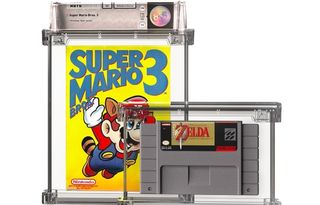Lawsuit against videogame grading service Wata alleges manipulation of retro game prices
The price of collectible games has exploded in recent years, and this lawsuit alleges that wasn't an organic development.

As reported by VGC, collectible grading service Wata is facing a class-action lawsuit over allegedly conspiring with Heritage Auctions to pump up the value of rare videogames. Wata and Heritage both deny any wrongdoing.
Grading services like Wata assess the condition of mint videogames and assign them a rank based on that physical condition. The games are then sealed in a clear plastic housing for preservation with the rating clearly displayed.
While communicating with rival rating service VGA to research our round-up of the rarest collectible PC games, a company representative claimed that "our company does not provide any type of appraisal service and the market value is determined by the video game community."
In the past few years, the prices of collectible games have skyrocketed. In 2017, a sealed copy of Super Mario Bros. sold for $30,000 at auction, the most anyone had paid for a copy of a videogame to that point. This sale also took place before Wata had gotten up and running.
Between 2019 and the end of 2021, Wata-graded games sold through Heritage auctions broke the record for most expensive videogame ever sold six times in a row:
- February 2019: Super Mario Bros., $100,150
- July 2020: Super Mario Bros., $114,000
- November 2020: Super Mario Bros. 3, $156,000
- April 2021: Super Mario Bros., $660,000
- July 2021: The Legend of Zelda, $870,000
- July 2021: Super Mario 64, $1.56 million
That last record has since been broken by the $2 million sale of a Wata-graded copy of Super Mario Bros. on the website Rally.
The class action lawsuit alleges that Heritage and Wata coordinated media appearances and press releases to drive up the prices of collectible games, with Heritage taking a cut of successful sales and Wata's fee for its services being proportional to a game's estimated price.
PC Gamer Newsletter
Sign up to get the best content of the week, and great gaming deals, as picked by the editors.
In September of 2021, journalist Seth Abramson published an article to his Substack newsletter, Retro, alleging that Wata co-founder Mark Haspel was selling a significant volume of Wata-graded games through eBay. This goes against best practices and ethics among grading houses, and also directly contradicts statements by Wata president Deniz Khan to the New York Times that the company's employees would not personally sell Wata-graded games due to the potential conflict of interest. Also covered by Abramson through Retro, Haspel subsequently admitted to selling Wata-graded games, while also claiming to have distanced himself from the company. Despite this, Haspel continues to have a featured place on the company website alongside the rest of its executive team.
The big-ticket items of the overheated collectible games market are mostly classic console releases, but as we noted in our report on rare big box games, things are getting pretty crazy on the PC side as well.
Ultima: Escape From Mt. Drash has one of the best claims to the title of all-time rarest PC game, being a cassette-based entry of a popular series with an exceedingly limited original retail distribution. A copy sold for $9,002 in 2017 before the current market developed, and no new copies have gone on sale since.
Last December, a DOS copy of the original John Madden Football sold for an astonishing $25,000 on eBay, and collectible PC games are regularly selling for over $1,000 at auction—once an extreme rarity according to Joel McCoy, administrator of the Big Box PC Game Collectors Group on Facebook.
Thankfully, the current situation around NFTs and cryptocurrency shows us that the aggressive overvaluing of assets like this could never catastrophically collapse and take people with it—the line just keeps going up and up.
Ted has been thinking about PC games and bothering anyone who would listen with his thoughts on them ever since he booted up his sister's copy of Neverwinter Nights on the family computer. He is obsessed with all things CRPG and CRPG-adjacent, but has also covered esports, modding, and rare game collecting. When he's not playing or writing about games, you can find Ted lifting weights on his back porch.
Most Popular



